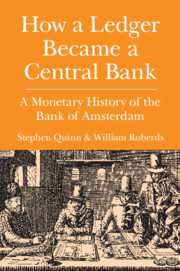Book contents
- How a Ledger Became a Central Bank
- Studies in Macroeconomic History
- How a Ledger Became a Central Bank
- Copyright page
- Dedication
- Contents
- Figures
- Tables
- Acknowledgments
- Disclaimer
- 1 Similar yet Different?
- 2 The World of the Bank
- 3 Coins in Eighteenth-Century Amsterdam
- 4 First Steps, 1609–1659
- 5 Emergence of the Receipt System, 1660–1710
- 6 Metal in Motion: The Mechanics of Receipts
- 7 Two Banks and One Money, 1711–1791
- 8 Prussia’s Debasement during the Seven Years War: the Role of the Bank
- 9 The Bank’s Place in Central Bank History
- Glossary
- Primary Sources
- References
- Index
3 - Coins in Eighteenth-Century Amsterdam
Published online by Cambridge University Press: 16 November 2023
- How a Ledger Became a Central Bank
- Studies in Macroeconomic History
- How a Ledger Became a Central Bank
- Copyright page
- Dedication
- Contents
- Figures
- Tables
- Acknowledgments
- Disclaimer
- 1 Similar yet Different?
- 2 The World of the Bank
- 3 Coins in Eighteenth-Century Amsterdam
- 4 First Steps, 1609–1659
- 5 Emergence of the Receipt System, 1660–1710
- 6 Metal in Motion: The Mechanics of Receipts
- 7 Two Banks and One Money, 1711–1791
- 8 Prussia’s Debasement during the Seven Years War: the Role of the Bank
- 9 The Bank’s Place in Central Bank History
- Glossary
- Primary Sources
- References
- Index
Summary
This chapter discusses categories of precious metal assets (bullion, trade coins, and local coins) and their roles within eighteenth-century Amsterdam. Bullion was valued for its fine content, but failed to meet the modern definition of a “safe asset,” because its use as a means of payment was limited by the need for assay. Popular varieties of high-denomination trade coins, on the other hand, did function more as safe assets because they circulated freely, often cross-border, at premia above the value of their advertised fine content. The Bank’s archives show that these trade coins were seen as safe enough to value by “tale,” that is, by enumeration. Trade coins were the major form of collateral held at the Bank. However, the Bank also occasionally dealt in low-denomination local coins. Local coins were rarely employed in international trade but were commonly used within the domestic economy of the Dutch Republic and nearby areas. The chapter explains that players in the Amsterdam market, the Bank included, always viewed these categories of precious metal as distinct types of assets.
- Type
- Chapter
- Information
- How a Ledger Became a Central BankA Monetary History of the Bank of Amsterdam, pp. 53 - 80Publisher: Cambridge University PressPrint publication year: 2023

